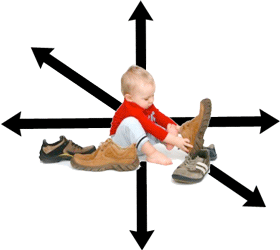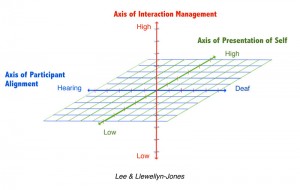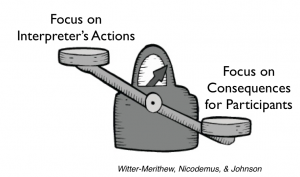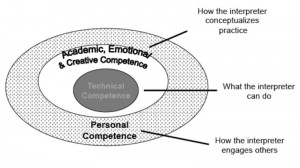 Working at the intersection of linguistics, ethical decision-making, and educational development
Working at the intersection of linguistics, ethical decision-making, and educational development
Resources for Participants
This workshop is an exploration of some issues addressed in a blog posting by Doug Bowen-Bailey on StreetLeverage.com.
Workshop Description
Interpreters and transliterators need to make choices in the classroom that will facilitate student growth and learning as well as empowering teachers to be successful. Basing our discussion on the work of Robert Lee and Peter Llewellyn-Jones, we will explore the ways that interpreters and transliterators function in the classroom and what “role-space” is needed for learning and growth to take place. We will also draw on the work of Robyn Dean and Bob Pollard and their concepts related to Demand-Control Schema – and on the work of Witter-Merrithew, Nicodemus, and Johnson and their work on Relational Autonomy. In all of this, we will have an opportunity to discuss specific challenges that might come up in classrooms and successful strategies for managing them. THIS IS AN EXCELLENT OPPORTUNITY FOR TEACHERS TO BE IN DISCUSSION WITH INTERPRETERS ABOUT BEST PRACTICES IN THE CLASSROOM.
Workshop Objectives
Successful participants will be able to:
- Explain the three dimensions of interpreter role-space
- Identify at least 5 factors that affect the choices interpreters make in how they function in a classroom setting
- Identify 3 specific linguistic features that will influence the choices of an interpreter/transliterator
- Analyze interpreting situations and determine the dimensions of role-space used by an interpreter
This session will be extremely interactive – using a combination of brief presentation and large and small group discussions.
Workshop Resources
Demand-Control Schema
Publications
The work by Robyn Dean and Robert Pollard has facilitated a fundamental shift in the interpreting profession from a deontological sense of ethics to a more teleological one. If you are curious about what that means, check out their web site at: Demand-Control Schema
From their web site, you can contact Robyn Dean for the latest information. It is important to recognize that understandings of the Demand-Control Schema is not static. Dean & Pollard are continuing to refine the application of DC-S so be sure to look for the most up-to-date publications and materials.
The latest article from Dean and Pollard which contains the most updated formulation of the Demand-Control Schema in an article format.
Dean & Pollard, 2012. Context-based Ethical Reasoning in Interpreting: A Demand Control Schema Perspective. The Interpreter and Translator Trainer, 5(1) 2011, 155-82.
You can access more of Dean’s publications here.
Webinars & Videos
MARIE Center Webinars
Robyn Dean did a series of webinars in 2014 for the MARIE Center as part of the NCIEC. These are presented in spoken English with captioning and ASL interpretation.
Videos as Part of NCIEC Mentoring Toolkit
Robyn Dean and Bob Pollard created a series of ASL videos explaining the Demand-Control Schema. (These are created in ASL without any English translation.) See those videos under the heading “Robyn Dean.”
Additional Resources
Facebook: get updated information here.
Observation-Supervision: Here’s a blog post from Robyn Dean about the important of developing these groups for observation-supervision.
 Text Book: In 2013, Robyn Dean and Robert Pollard published a textbook on Demand-Control Schema. You can order a copy here.
Text Book: In 2013, Robyn Dean and Robert Pollard published a textbook on Demand-Control Schema. You can order a copy here.
A Resource on Tacit Schemas for Ethical Decision-Making
Rest, J.R., Navarez, D., Bebeau, M., and Thoma, S.J. (1999). Postconventional moral thinking: A neo-Kohlbergian approach. Mahwah, NJ: Lawrence Erlbaum Associates.
Role-Space
The most complete treatment by Robert Lee and Peter Llwellyn-Jones is in their book:
Re-Defining the Role of the Community Interpreter: The concept of role-space. 2014. Lincoln, UK: SLI Press. View on Amazon.
- The presentation from Robert Lee and Peter Llewellyn-Jones from the CIT Conference
- A paper from Supporting Deaf People conference in 2011
- A video explanation in ASL of this concept by Robert Lee – created for the Gallaudet University Regional Interpreter Education Center
Handouts
Here are the resources for the workshop.
Relational Autonomy
 Relational Autonomy – Presentation by Anna Witter-Merithew & Brenda Nicodemus
Relational Autonomy – Presentation by Anna Witter-Merithew & Brenda Nicodemus
Blog Posts on Street Leverage on related topics by Anna Witter-Merithew:
- Sign Language Interpreters: Stepping Out of the Shadow of Invisibility
- Sign Language Interpreters: Are Acts of Omission a Failure of Duty?
- Sign Language Interpreters: Breaking Down Silos Through Reflective Practice
 Nurse Autonomy as Relational by Chris MacDonald (Contact Doug for further information)
Nurse Autonomy as Relational by Chris MacDonald (Contact Doug for further information)



